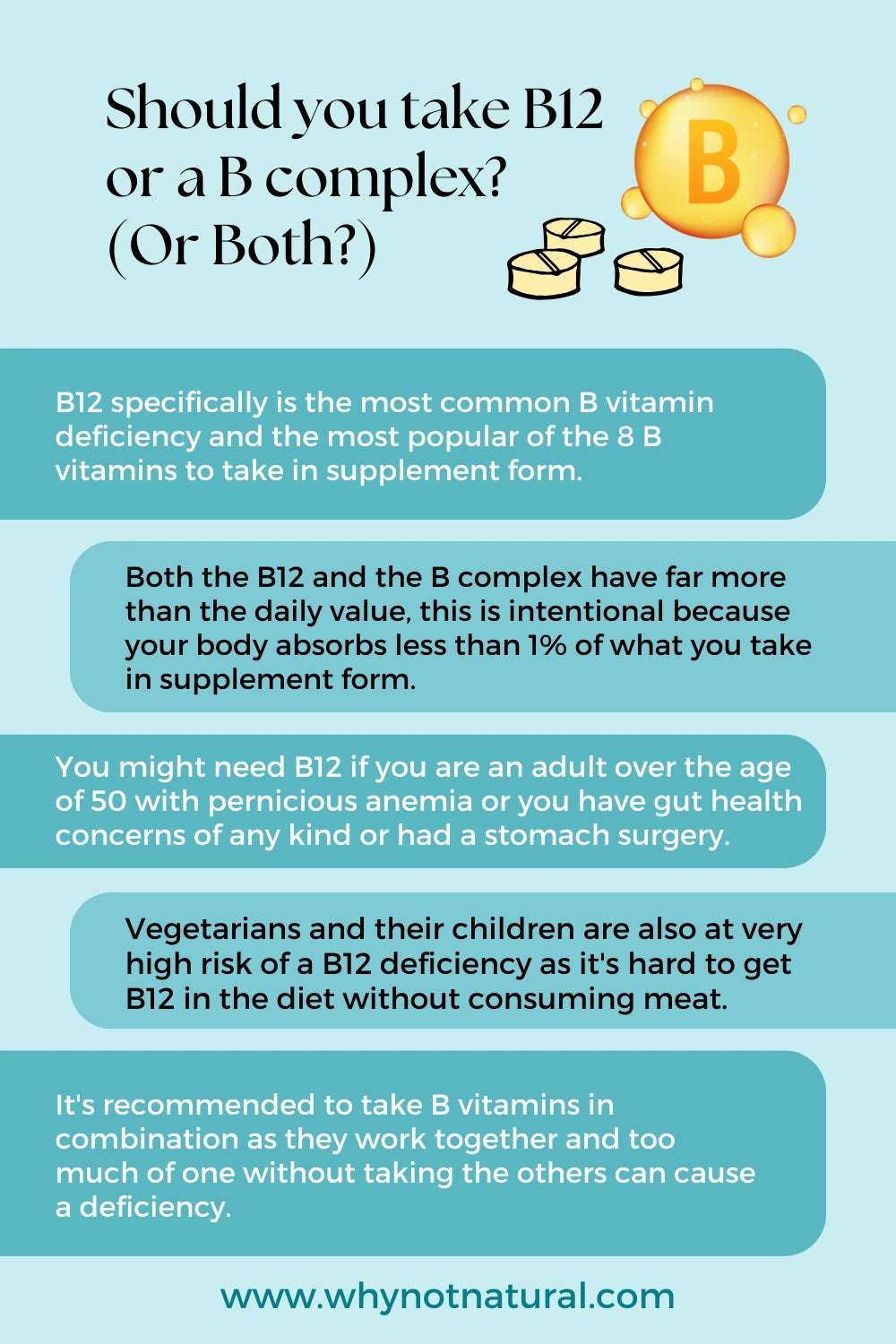

· By Kelin Marquet
Should you take B12 or a B complex? (Or Both?)
Should you take a B12, a B complex, or both? We get asked this question all the time, and after reading this article you'll know exactly which option is best for you.
What is a B Complex?
The B complex includes all 8 B vitamins, including:
There are different forms of each B vitamin with varying bioavailability. You can read about how to choose a B complex supplement along with all the benefits of a good supplement in this article.
As you probably noticed, a B complex should contain B12. The Why Not Natural B complex (here) does contain B12, however, the B12 supplement (here) contains 10 times the amount of B12 found in the B complex per serving.
Why Should You Take B12?
B12 specifically is the most common B vitamin deficiency and the most popular of the 8 B vitamins to take in supplement form.
Taking a B12 supplement can improve your blood and nerve cells, energy, sleep, skin, and more. You can read more about the benefits here.
You can also read about the signs of a B12 deficiency here, which can all be reversed through supplementation, if B12 deficiency is indeed the root cause.
Why Do B12 Supplements Contain So Much B12?
Both the B12 and the B complex have far more than the daily value, this is intentional because your body absorbs less than 1% of what you take in supplement form. Don't worry, though: you cannot “overdose” on B12. Your body doesn’t store it and there's no upper limit on how much you can take. (1)
Can I increase my Absorption of B12?
Yes! One way to increase the absorption of a B12 supplement is to spread it out throughout the day. This is because the percentage your body absorbs is inversely proportional to the amount you take - in other words, it might absorb 50% of a drop of B12, but only 0.5% of a large dose (the rest will be excreted in the urine).
It's also important to take a bioavailable form like methylcobalamin. All B vitamins, including B12, should be taken on an empty stomach.
Who is at High Risk of a B12 deficiency?
Adults over the age of 50, those with pernicious anemia (especially common in those with European ancestry and the root cause of many deficiencies), people with gut health concerns of any kind, and those who have had stomach surgery are at particularly high risk of a B12 deficiency.
Vegetarians and children of vegetarian mothers are also at very high risk of a B12 deficiency as it's hard to get B12 in the diet without consuming meat.
Other conditions like hypothyroidism and arthritis can also increase the risk of deficiency. If you experience any symptoms of deficiency or suspect you may be in a high risk category, you should reach out to your healthcare provider for a blood test, as B12 deficiency can be debilitating but is very easily treated.
When You Should Take both B12 and B Complex
If you fall into one of the categories of "High Risk" above or you already know you have a B12 deficiency, you need more B12 than the general population.
People who fall into this group will need more B12 than others, and in this case it's a good idea ot consume both a B complex and a B12 supplement, as the amount of B12 in a B complex may not be adequate for your needs.
When You Should Take Only a B Complex
In cases where there's low risk of B12 deficiency, a B complex will be more than adequate to meet your B vitamin needs.
We always recommend taking B vitamins in combination as they work together and too much of one without taking the others can cause a deficiency, which is why our B complex contains all 8 B vitamins (some formulations leave certain critical B vitamins out because of their strong taste, but we have faith in our customers to understand why the strong taste is worth it!).
What If You're Getting Too Much B12?
If you don't need the extra B12 and you take both B12 and B complex, don't worry: you can't overdose on B12. Even at very high doses, B12 has been proven safe so there's no "upper limit" on intake.
However, since your body has no use for it and will simply excrete it, it's unnecessary to do so and potentially expensive over time! If you're not sure, we recommend taking the B complex alone for a week or two and then with the B12 to see if you feel a difference.
If there's no difference, you're probably fine sticking with the B Complex!

References
(1) https://ods.od.nih.gov/factsheets/VitaminB12-HealthProfessional/#:~:text=No%20evidence%20indicates%20that%20absorption,mcg%20%5B23%2C24%5D.
